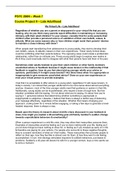Summary
Summary PSYC 290N Week 7 Course Project II: My Virtual Life – Late Adulthood: Section 3–60 to 80 years.
- Institution
- Devry University
PSYC 290N Week 7 Course Project II: My Virtual Life – Late Adulthood: Section 3–60 to 80 years. PSYC 290N – Week 7 Course Project II – Late Adulthood My Virtual Life – Late Adulthood Regardless of whether you are a parent or step-parent in your virtual life that you are leading, why do y...
[Show more]



